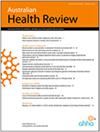希腊一家地区综合医院护士的职业压力:从COVID-19大流行中吸取的教训
IF 1.4
4区 医学
Q3 HEALTH CARE SCIENCES & SERVICES
引用次数: 0
摘要
职业压力会影响护士的身心健康,同时对所提供服务的质量产生负面影响。本研究调查了新冠肺炎大流行第二年护士的职业压力,以及社会人口学特征和护士对工作、组织承诺和健康状况的感知对上述变量的影响。希腊某地区公立综合医院的104名护士于2022年第三学期参加了横断面研究。ASSET(一种缩短的压力评估工具)问卷被翻译成希腊语,并根据研究目的进行了改进。Cronbach’s alpha为0.858。假设检验采用独立样本t检验、方差分析和Bonferroni检验。采用多元一般回归分析来检验压力与其他变量之间的关系。统计学显著性阈值设为0.05。89名女性(85.6%)和15名男性(14.4%)参与了这项研究。大多数是30-50岁(73.1%)和高等教育毕业生(50.96%)。28.9%的样本受雇于重症监护病房(ICU)、急诊科和COVID-19 ICU/诊所。63.5%的护士认为自己的健康状况良好,10.6%的护士认为自己的健康状况较差,43.7%的护士认为自己的工作效率低于89%。护士的工作压力从中等到高度不等。工作压力与社会人口学参数之间无统计学差异。护士对本组织的看法,表现为对工作环境的承诺、奉献和满意度,对工作压力有统计上显著的影响。积极的观念与较低的压力水平和较好的健康和幸福有关。感知组织支持和组织承诺对护士工作压力有预测作用。本研究表明,参与式领导与以护理人员发展和持续学习为导向的组织文化相结合,对护理人员在危机时刻的赋权、准备和复原力有积极的作用。本文章由计算机程序翻译,如有差异,请以英文原文为准。
Occupational Stress Experienced by Nurses of a Greek Regional General Hospital: Lessons Learned from COVID-19 Pandemic
Occupational stress can affect nurses’ mental and phys- ical health, while negatively affecting the quality of the services provided. This study investigates the occupational stress of the nurses during the second year of the COVID-19 pandemic, and the effect of sociodemographic characteristics and nurses’ perceptions of their job, organization- al commitment, and health status on the aforementioned variable. 104 nurses of a Greek regional public General Hospital participated in the cross-sectional study, in the third semester of 2022. The ASSET (A Shortened Stress Evaluation Tool) questionnaire was translated into Greek, and refined to the study aim. Cronbach’s alpha was 0.858. The independent samples t Test, ANOVA, and Bonferroni test were applied in hypothesis testing. Multiple general regression analysis was used to examine relationships between stress and other variables. The statistical signifi- cance threshold was set at 0.05. 89 women (85.6%) and 15 men (14.4%) participated in the study. The majority are aged 30-50 years (73.1%) and graduates of higher education (50.96%). 28.9% of the sample are employed in the Intensive Care Unit (ICU), Emergency Department, and COVID-19 ICU/Clinics. 63.5% of the nurses characterized their health condition as good and 10.6% as poor, while 43.7% said they felt less than 89% productive. Nurses' work stress ranges from moderate to high levels. There is no statistically significant difference between work stress and socio-demographic parameters. Nurses’ perceptions of the Organization, expressed as commitment, dedication, and satisfaction related to the working environment, have a statistically significant effect on work stress. Positive per- ceptions are related to lower levels of stress and better health and well-being. Perceived organizational support and organizational commitment predict the work stress the nurses’ experience. The current study indicates that participative leadership combined with organizational culture oriented to the development and continuous learning of the nursing staff can positively contribute to its empowerment, preparedness, and resilience in times of crisis.
求助全文
通过发布文献求助,成功后即可免费获取论文全文。
去求助
来源期刊

Australian Health Review
医学-卫生保健
CiteScore
2.90
自引率
5.60%
发文量
134
审稿时长
6-12 weeks
期刊介绍:
Australian Health Review is an international, peer-reviewed journal that publishes contributions on all aspects of health policy, management and governance; healthcare delivery systems; workforce; health financing; and other matters of interest to those working in health care. In addition to analyses and commentary, the journal publishes original research from practitioners – managers and clinicians – and reports of breakthrough projects that demonstrate better ways of delivering care. Australian Health Review explores major national and international health issues and questions, enabling health professionals to keep their fingers on the pulse of the nation’s health decisions and to know what the most influential commentators and decision makers are thinking.
Australian Health Review is a valuable resource for managers, policy makers and clinical staff in health organisations, including government departments, hospitals, community centres and aged-care facilities, as well as anyone with an interest in the health industry.
Australian Health Review is published by CSIRO Publishing on behalf of the Australian Healthcare and Hospitals Association.
 求助内容:
求助内容: 应助结果提醒方式:
应助结果提醒方式:


